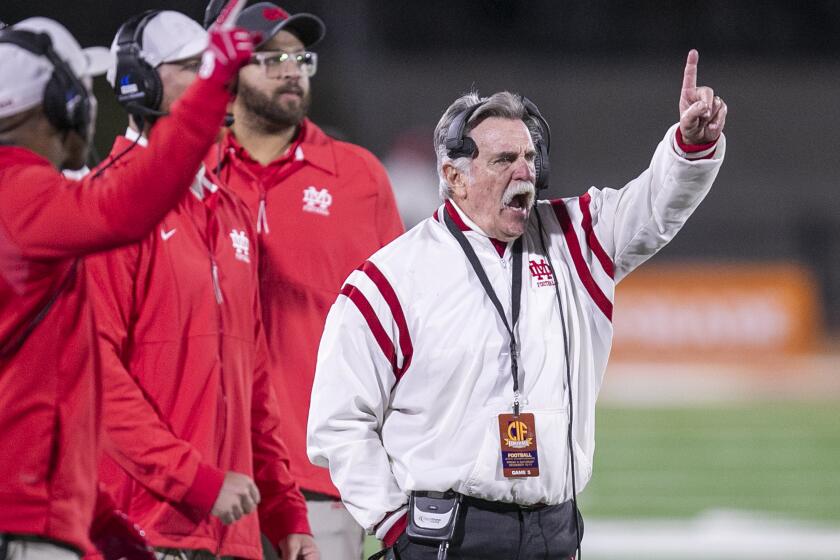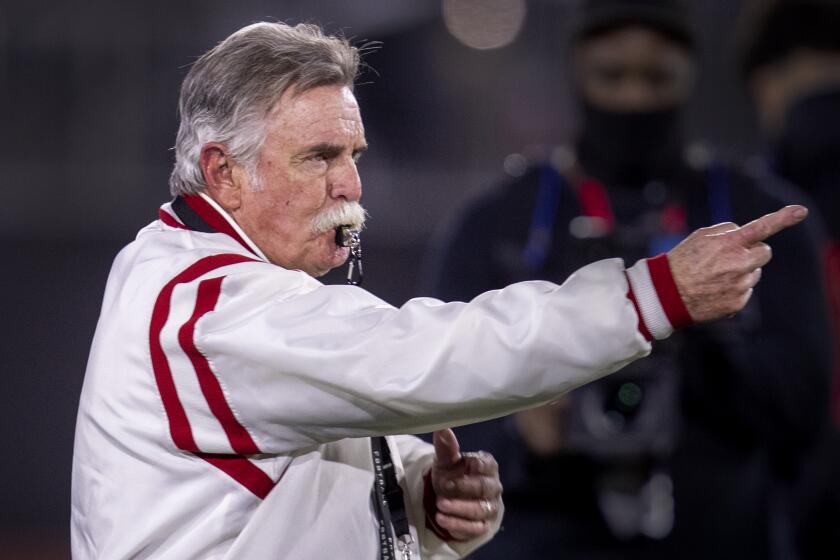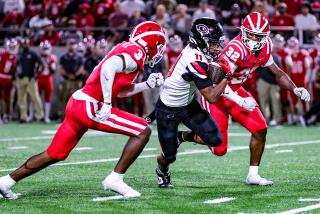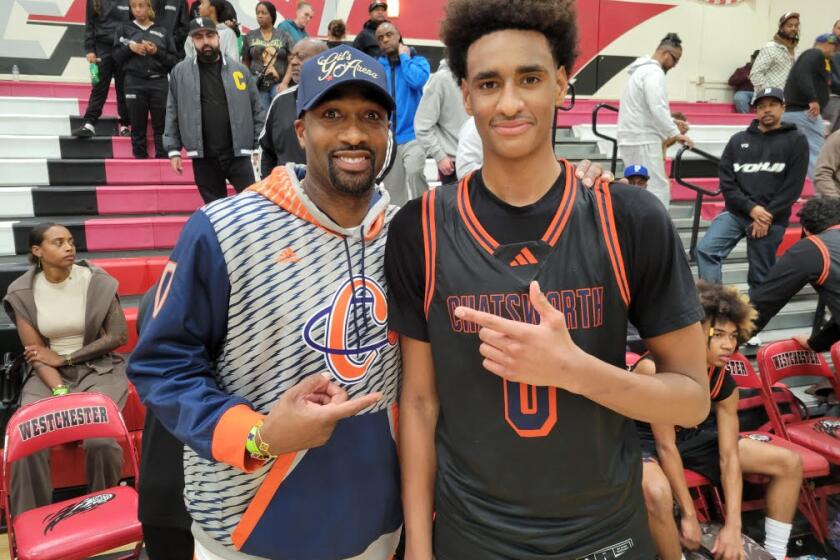Column: With no accountability, Mater Dei coach Bruce Rollinson retires under a dark cloud
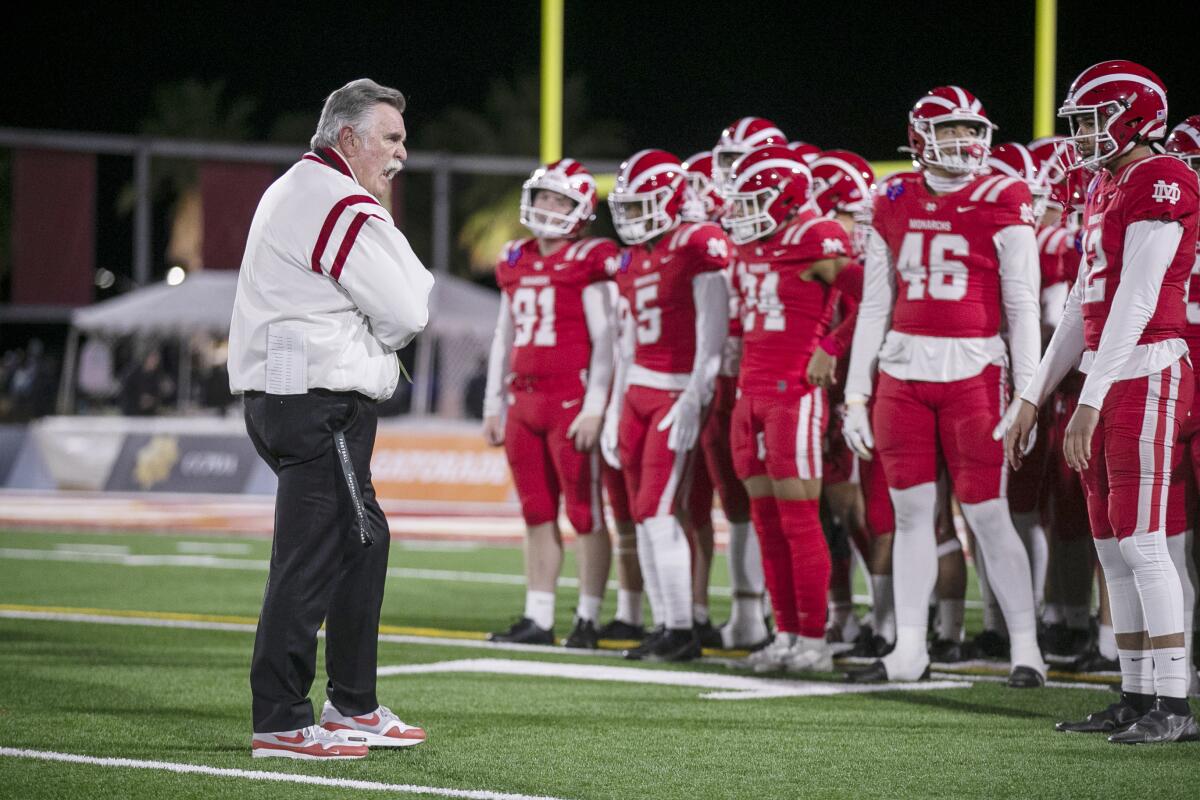
He stood at midfield in the Rose Bowl, a triumphant figure poised at the center of the national prep football universe, basking on the precipice of retirement from a long and illustrious career.
Then why doesn’t Bruce Rollinson want to talk about it?
He appeared at one of the final stops on his victory tour Monday, one last chance to expound on his 34 years of glory, the esteemed Mater Dei coach attending a press luncheon in advance of Friday’s Southern Section Division I championship game at the Rose Bowl against St. John Bosco.
So why wouldn’t Bruce Rollinson answer the most obvious of questions?
This columnist showed up to ask him about the strange circumstances surrounding his sudden retirement announcement earlier this month. It is a question that is being asked throughout the Southern California prep sports world and beyond. It has been the subject of rampant speculation and incessant rumor.
Rollinson could have followed his own teachings of accountability by simply providing an explanation.
He refused. He refused to address it. He refused to discuss it. He said he wouldn’t talk about it until after the season.
A man who had recently claimed to happily retire wasn’t taking retirement questions. Period.
It was just another exclamation point in an ugly saga that just became even more unsightly. Far from this being a grand farewell, it’s appearing more like a long and lousy goodbye.
Mater Dei High should have few problems finding a capable replacement for football coach Bruce Rollinson, who will retire at the end of the year.
The latest chapter was written earlier this month when Rollinson, 73, took all the attention away from unwitting players and turned the spotlight on himself by doing a massive flip-flop in announcing he was retiring at the end of the season.
He made this announcement just a month after telling a local newspaper that he was coming back.
“I’m pretty confident in telling you that I will be back for the 2023 season,” he told Dan Albano of the Orange County Register in October.
He made this announcement smack in the middle of a playoff run with the top-ranked team in the country seemingly headed for its fourth state title in six years.
“I’m close with a lot of these young players, and want to see them get better and better,” he told Albano.
He made this announcement even though nowhere in the five-paragraph retirement statement does he actually say why he is retiring.
Nothing about health. Nothing about weariness. Nothing about spending more time with family.
Rollinson ended a 34-year tenure as arguably the most powerful figure in Southern California sports with no more insight other than, “I have recently decided that this year will be my last year as head coach of Mater Dei football.”
Who does that?
Somebody who is being forced out, that’s who.
There is no concrete evidence of this, but it sure sounds like it, and it’s about time.
A year ago, this column space called for the dismissal of Rollinson in the wake of a lawsuit that vividly depicted a hazing incident while exposing the football program’s culture of arrogance, entitlement and callousness toward student safety.
Rollinson initially kept his job probably because, as a sworn deposition by former athletic director Amanda Waters elicited, the school is all about image over integrity, and winning above everything.
But two things could be happening that would lead Mater Dei to cut ties with the legendary coach and finally separate itself from the scandal.
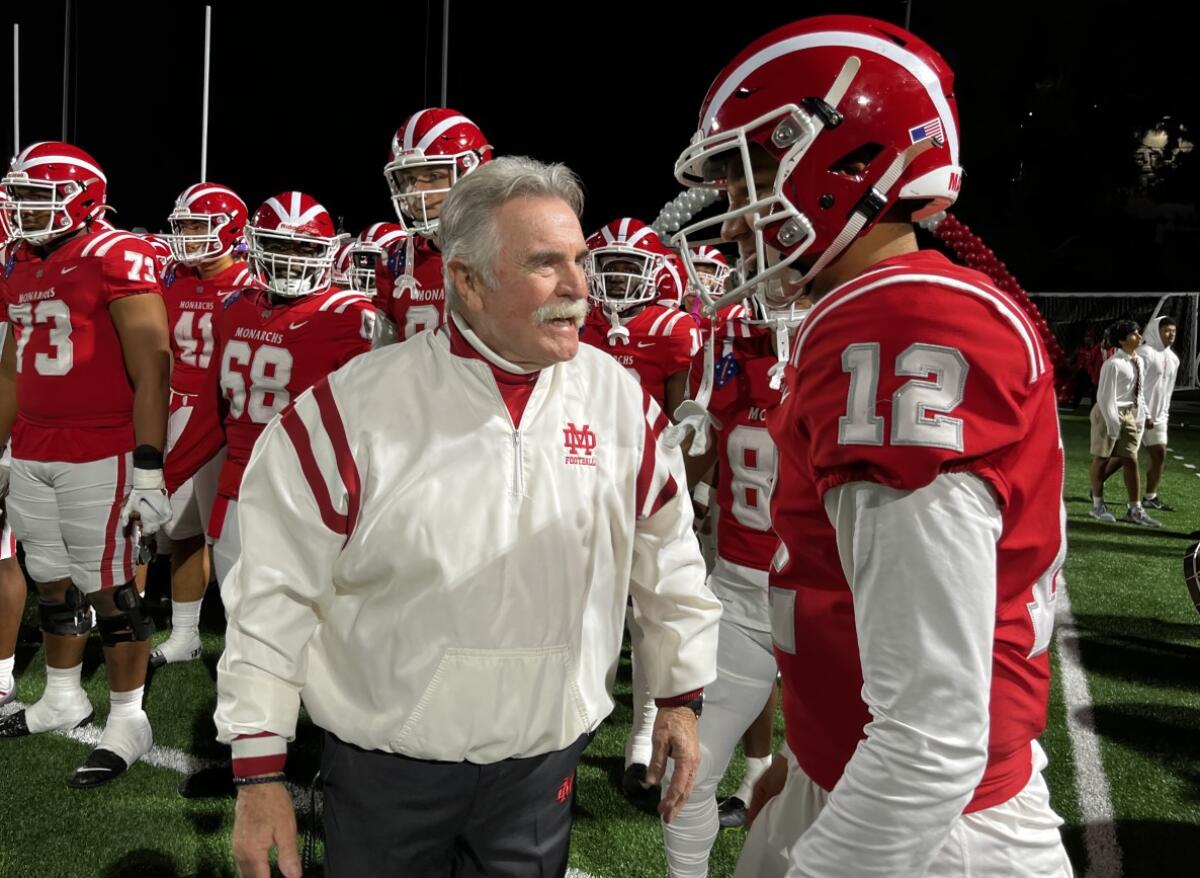
First, the school might finally be completing a safety assessment that was launched a year ago in the wake of the lawsuit, in which video surfaced of a former player suffering a brain injury in a locker room beating during an allegedly team-sanctioned fight.
The spokesman for the Diocese of Orange did not respond to queries about the status of the assessment. Its slow pace has led to questions about its seriousness. But if student safety is an actual Diocese of Orange priority, any valid evaluation will have Rollinson’s fingerprints all over it.
Second, concerns over the assessment findings could be compounded by an apparent monetary resolution of the lawsuit. There has been a notice of settlement filed in Orange County Superior Court. There’s no indication of the settlement value, but the lawsuit is linked to Rollinson’s behavior, and certainly triggered the safety assessment, none of which looks good for the coach.
The most damning evidence of Rollinson’s tacit approval of the toxic culture could be found in Waters’ previously reported deposition, which portrayed the coach as complicit and uncaring.
Witness the testimony from Waters about Rollinson’s reaction to her numerous requests that he monitor a locker room where various forms of hazing had become common practice.
“I don’t have time to do that s—,” Rollinson reportedly told her.
The testimony also included Rollinson reportedly confirming the hazing fighting ritual known as, ‘Bodies.’
“He said, ‘If I had a dollar for every time these kids played ‘Bodies,’ I’d be a millionaire,’ ” Waters testified.
There have been other allegations of violence under Rollinson’s watch, including a misdemeanor assault charge filed against him in 1989 after a Mater Dei head athletic trainer accused him of choking her. The misdemeanor trial ended in a hung jury and Rollinson pleaded no contest to disturbing the peace. More recently, a 2019 civil lawsuit accused two football players of beating up a basketball player at the request of a teammate.
In all, despite the shiny veneer of another potential title run, Rollinson will apparently end his tenure in the darkness of controversy. Absent of valid explanations or clarity, he will retire as a great football coach whose unabated thirst for championships eventually put his players, employer and others at risk, a legend that Mater Dei could simply no longer afford to employ.
In the lawsuit, Waters testified that Rollinson was “agitated” she wanted to talk about the “Bodies” fight and made it clear the conversation was over.
“He didn’t like to be challenged,” she said. “When he says what he says and he’s done talking about it, he will make it very clear he’s done talking about it.”
Longtime Mater Dei football coach Bruce Rollinson, whose program was embroiled by hazing allegations last year, is retiring at the end of the season.
Rollinson may not want to talk about his retirement, but Mater Dei and the Diocese of Orange owe the community an explanation.
How prevalent was hazing, and how can anyone believe that it has stopped? How can anyone have faith that the new coach and culture will be any different? How can anyone trust them with the future when they won’t acknowledge mistakes of the past?
Still looking for answers Monday, this columnist asked Mater Dei athletic director Joel Hartmann the lingering question.
Was Bruce Rollinson forced to retire?
“I believe him when he says it was his choice and his choice only,” said Hartmann.
He might be the only one.
More to Read
Get our high school sports newsletter
Prep Rally is devoted to the SoCal high school sports experience, bringing you scores, stories and a behind-the-scenes look at what makes prep sports so popular.
You may occasionally receive promotional content from the Los Angeles Times.

